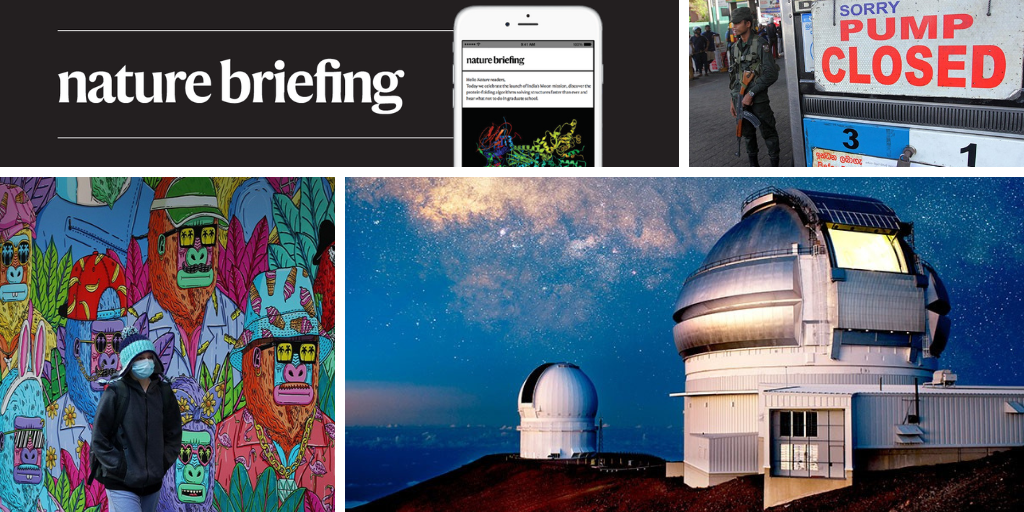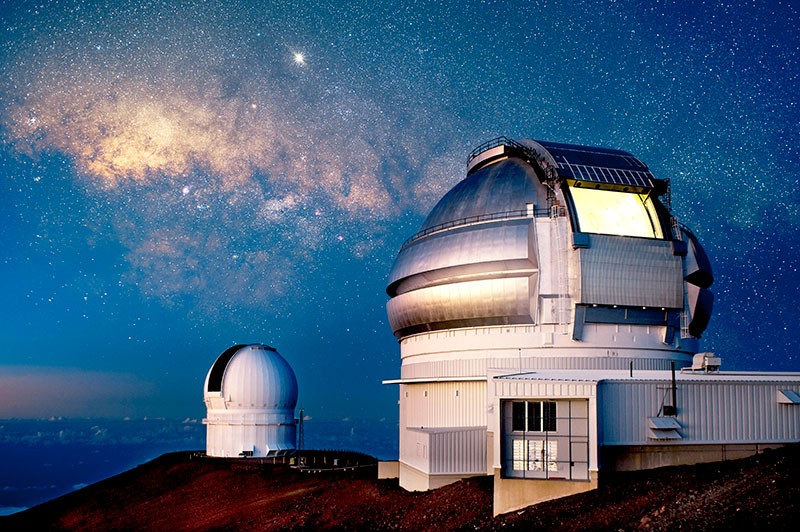Hello Nature readers, would you like to get this Briefing in your inbox free every day? Sign up here
The state of Hawaii has set up a new way to manage the mountain Maunakea, the summit of which is home to many world-class astronomical observatories. A law signed by Hawaii’s governor on 7 July removes the University of Hawaii from its role as the main authority overseeing the land on which the telescopes sit, and gives that responsibility to a newly established group with much broader representation of the community, including Native Hawaiians. Many hope that the shift will mark a path forwards for astronomy in Hawaii, after years of demonstrations and debate over the further exploitation of land with broad spiritual and cultural importance.
Data from Qatar suggest that natural immunity induced by infection with SARS-CoV-2 provides a strong shield against reinfection by a pre-Omicron variant for 16 months or longer. This protection against catching the virus dwindles over time, but immunity triggered by previous infection also thwarts the development of severe COVID-19 symptoms — and this safeguard shows no signs of waning. Scientists also warn that the study’s results do not mean that infected people can skip vaccination. A separate study by many of the same authors found that people who had both natural immunity and vaccine immunity were substantially more protected against the virus than people who had only one of the two.
Reference: medRxiv preprint (not peer reviewed) & The New England Journal of Medicine paper
With the country in vast amounts of debt and inflation sky-high, Sri Lanka doesn’t have enough money to import fuel, exacerbating food shortages. And after wave after wave of COVID-19, Sri Lanka is now experiencing a massive outbreak of dengue fever. Immunologist Neelika Malavige, who has studied dengue for more than a decade, says that her work is being hampered by fuel shortages and power cuts. “I spend most of my time troubleshooting,” she says.
Woodpeckers regularly smack their heads into trees at a rate of 20 times per second, seemingly without doing damage to their brains. Researchers have long thought the birds were somehow cushioning these blows to their brains with a spongy skull bone or elongated tongue. But researchers analysed high-speed footage of six woodpeckers and found that their heads moved just as fast as their beaks, and simulations found that they probably didn’t use shock absorption because it would require them to bang their heads harder. The study suggests that woodpeckers instead avoid concussions because of their brain’s small size and positioning.
Reference: Current Biology paper
Extreme weather driven by climate change will catalyse more violence towards women and people from gender minorities. Researchers examined events in the aftermath of floods, droughts, cyclones and heatwaves, among other weather disasters, over the past two decades. They found that these events exacerbate poor economic and social conditions linked to gender-based violence, from physical and sexual assault to forced marriage, trafficking and psychological abuse. The reasons vary: in Bangladesh, for example, some girls have been forced to marry in the aftermath of extreme floods that put financial pressure on their families. The report is notable because it made the effort to include people from sexual and gender minorities such as transgender or gender non-binary individuals and those who identify as LGBTQ+.
Reference: Lancet Planet Health paper
Features & opinion
The COVID-19 pandemic put unprecedented pressure on the group of public-health physicians, epidemiologists and other specialists who advise the World Health Organization (WHO) on how to distribute vaccines. For the first time, they called on ethicists to help. “It was not lost on any of us that — assuming vaccines would protect people from severe disease and death — we were making recommendations that could affect who would live and who would die,” write nine of the specialists. They share lessons for those trying to better prepare the world for a future pandemic.
A chemist and amateur chef takes on the challenges of cooking on Mars in the latest short story for Nature’s Futures series.
In the tropics, there are no ice cores to preserve the deep history of Earth’s climate in their frozen layers, so long-term records have been absent. Now researchers have uncovered a sediment core in Peru which reveals around 700,000 years of climatic history.
Nature Podcast | 28 min listen
Subscribe to the Nature Podcast on Apple Podcasts, Google Podcasts or Spotify.








More News
Author Correction: Stepwise activation of a metabotropic glutamate receptor – Nature
Changing rainforest to plantations shifts tropical food webs
Streamlined skull helps foxes take a nosedive